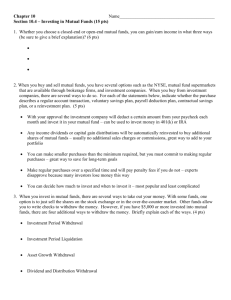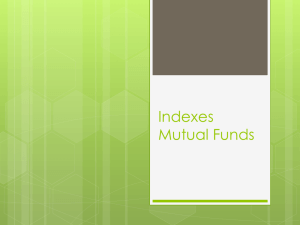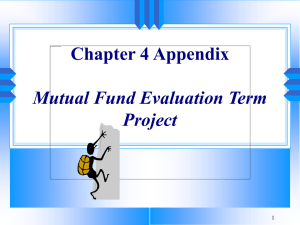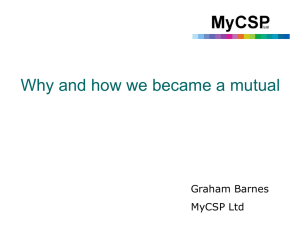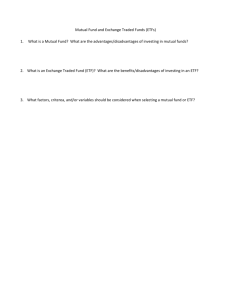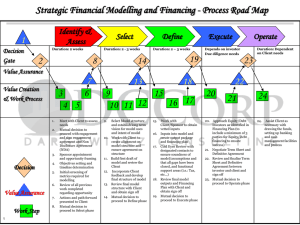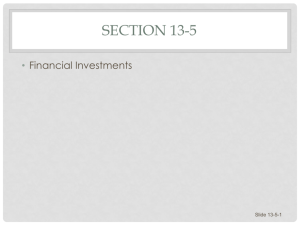Chapter 15
advertisement
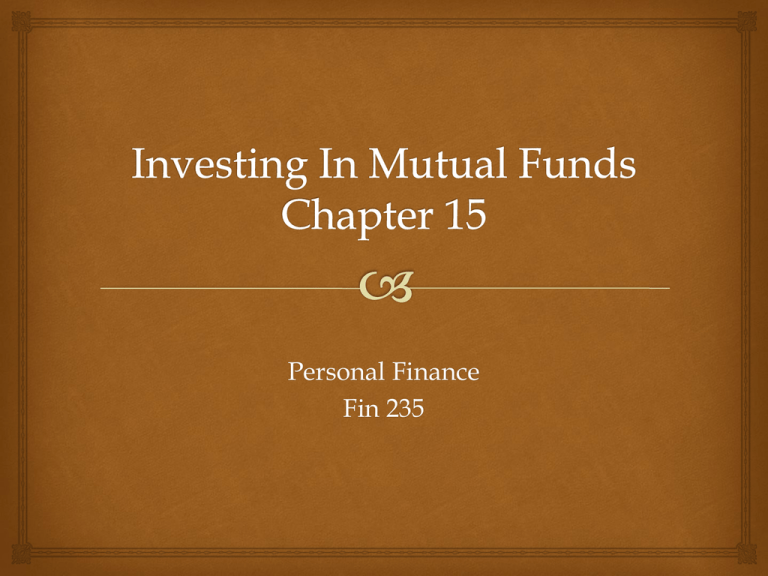
Personal Finance Fin 235 Mutual Fund Basics A. What is a Mutual Fund? 1. A pooling of investor capital to purchase a well diversified group of stocks and/or bonds 2. Securities may be from a single national market or may be diversified across numerous international markets. 3. Shares typically sell at their Net Asset Value (NAV) 4. Funds may be open-end or closed-end a. Open-End: Issuer buys and sells on a continuous basis b. Closed-End: Issuer sells once. Then shares will trade in secondary markets; e.g. NYSE, OTC, etc. Mutual Fund Basics B. No-Load Funds 1. 2. No Load funds do not charge sales fees. Fund managers are compensated by management fees C. Load Funds 1. 2. 3. Charge sales commissions on purchases or sales of shares. Sales charges discourage frequent trading (which imposes additional expenses on funds. Contingent Fees: a function of how long shares are held. D. 12-b1 Fees 1. Imposed to cover marketing expenses Why Mutual Funds? A. Mutual Funds allow small investors to hold well diversified portfolios of securities with a very small amount of capital. B. Mutual Funds provide small investors with a wide variety of investment objectives Exchange Traded Funds A. Why ETF’s? 1. Many mutual funds have minimum hold periods 2. ETF’s can be traded like stocks – most are very liquid 3. ETF’s provide a similar variety of investment objectives similar to mutual funds. Mutual Fund Classifications A. Objectives 1. 2. 3. Capital Appreciation Income Index B. Stock Funds 1. 2. 3. 4. 5. 6. Aggressive Growth: small cap, large cap, value Income Global: investing in foreign companies Index: tracking a particular index – S&P 500 Sector: Chemicals, Transports, Real Estate, etc. Country Funds: Canada, UK, France, Japan, etc. Specialized Funds A. B. C. D. Asset Allocation: Cash, Stocks, Bonds, International Balanced Funds: stocks and bonds Fund of Funds: hold shares in other mutual funds Life Cycle: changing riskiness of investments as investors get older. E. Money Market Funds: a place to park your capital when not invested ion the market – earn interest. Selecting a Mutual Fund A. Advisory Services 1. 2. 3. 4. Lipper Analytical Services Morningstar, Inc. Value Line Financial Publications a. Quarterly performance rankings B. Mutual Fund Prospectus 1. Everything you need to know about the fund 2. Must provide on request and to all new buyers. Mutual Fund Transactions A. Typical Transactions 1. Dividends a. b. c. 2. Capital Gains a. 3. 4. 5. Purchase additional shares Hold in money market Remit to investor Same as Dividends. Dividends and Capital Gains distributions taxed as ordinary income to investor. Regular monthly purchases: 401(k), 403(b), IRA Withdrawals: checks sent directly to investor. Homework A. Do The Math: 1 (a, b, c) B. Be Your Own Personal Financial Planner 1. 1- Your Mutual Fund Preferences (w/s 61) 2. 3 – Calculating Mutual Fund Returns (w/s 63)
